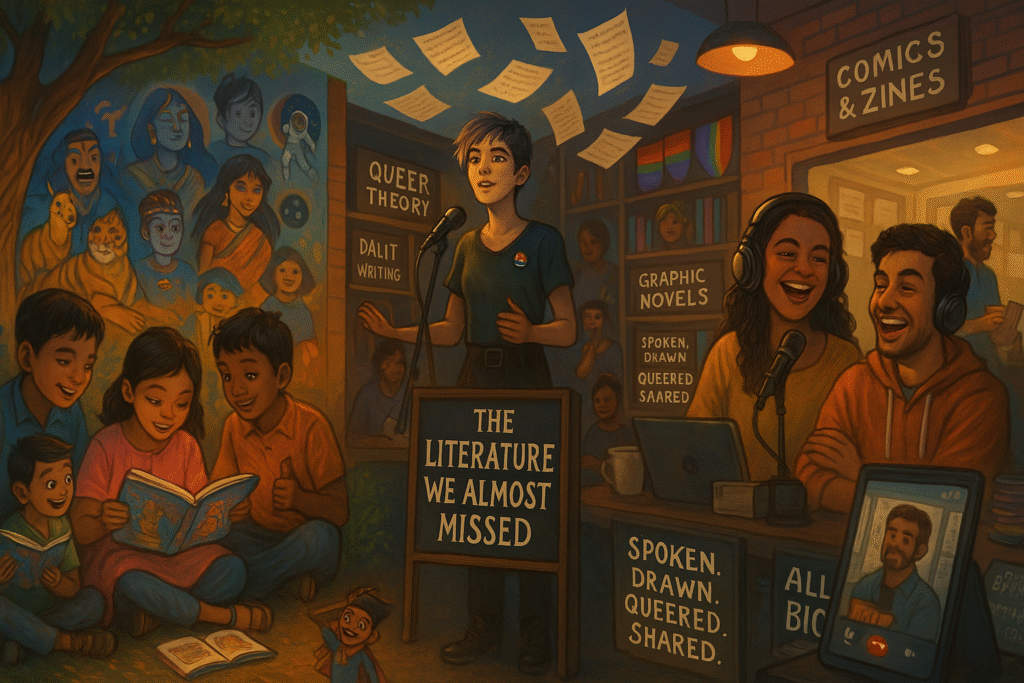From playgrounds to pride, from panels to podcasts—this is Indian English literature spilling out of the book and into everything else
By ABS, The Literary Scholar, who believes that children’s books, queer poems, podcasts and comics are all literature—just written in different dialects of truth.
You thought literature lived quietly between hardcovers? That it wore spectacles, used semicolons, and waited politely for awards?
Think again.
This scroll is for the genres that slipped through the syllabus, the voices that took a mic instead of a manuscript, and the stories that inked themselves in bubbles, binaries, and binaural beats.
This is the literature that didn’t always enter the room through the door—but showed up anyway, fabulous and unfiltered.
Section 1: The Kids Are All Write – Children’s & Young Adult Literature
Before they binge dystopias and mood disorders, kids actually do read.
And in India, they’re spoiled for choice.
Paro Anand’s No Guns at My Son’s Funeral doesn’t patronize. It hands children moral complexity on a steel plate. From Kashmir to classrooms, she writes about anger, fear, courage, and rebellion—without dumbing anything down.
Anushka Ravishankar brings nonsense verse and visual giggles, proving that rhyme is still legal in literary fiction—as long as it’s paired with a wild animal or a flying cow.
“If I were a grammar teacher, I’d wear a hat / And point at punctuation with a rubber bat.”
Meanwhile, Roopa Pai’s The Gita for Children proves philosophy can wear sneakers. And Samit Basu’s YA stories blend fantasy and comic chaos into superhero mashups that don’t need Marvel’s budget to thrill.
And then there’s Tanuja Desai Hidier, whose Born Confused was YA before YA was cool—a cultural coming-of-age story that launched a thousand brown girl identity crises (and possibly solved a few).
Children’s literature in Indian English today is witty, wise, multilingual, and often more honest than adult fiction.
Section 2: Queer Voices, Clear Truths – LGBTQ+ Indian English Literature
If Indian English fiction once feared the closet, today it opens it with a flourish and a sharp one-liner.
R. Raj Rao’s The Boyfriend (2003) was India’s first unapologetically gay English novel. It’s messy, honest, political, and laced with wry Mumbai humour.
Vivek Tejuja’s memoir So Now You Know walks us through queer loneliness and longing in India’s middle-class maze—with nostalgia, poetry, and sarcasm stitched together like a rainbow quilt.
“Coming out is never over. It’s daily, like brushing your teeth or fighting patriarchy.”
Sandip Roy’s Don’t Let Him Know is filled with half-truths, full hearts, and quiet devastation—a beautiful meditation on identity and inherited silence.
And of course, Vikram Seth, who never needed to out himself to weave queerness into every unspoken moment of A Suitable Boy.
There’s poetry too:
Alok Vaid-Menon redefines gender with performance and poise
Priya Malik and others slam, sob, and sass their way across open mics
This literature doesn’t ask for your approval. It tells the truth—and trusts you’ll catch up.
Section 3: Frames & Frequencies – Graphic Lit, Podcasts & Film Adaptations
Graphic Novels:
Welcome to the land of lines and legends.
Corridor by Sarnath Banerjee is India’s first graphic novel, full of urban malaise, irony, and chai-soaked philosophers in Daryaganj.
Adi Parva by Amruta Patil takes the Mahabharata, dips it in cosmic ink, and serves it back like sacred graffiti.
Appupen’s Halahala universe is dark, dystopian, stunning—less comic, more cautionary oracle.
These aren’t just illustrated books. They’re literary visions for readers who think in images and emotion.
Podcasts:
Words have gone wireless.
India Booked interviews authors with grace and depth.
Bound India mentors and moans about publishing.
Desi Books gives South Asian writers a mic, a voice, and a global listening room.
Khabar Lahariya, through audio storytelling, proves that grassroots journalism can be poetry—if you’re paying attention.
Film Adaptations:
Sometimes it works (The Namesake, The White Tiger), sometimes it hurts (Midnight’s Children, please forgive us). But adaptation is now part of the game.
And The Suitable Boy became a Netflix mini-series with more music than most Indian weddings.
Not every adaptation gets it right. But every one proves that Indian English literature isn’t just being read—it’s being watched, shared, subtitled, dubbed, and danced to.
Final Note: Where Lit Lives Now
It’s on a podcast app.
In a zine published by students.
In a queer poet’s Substack.
In a Bookstagram post with hashtags like #SouthAsianReads and #BrownAndBookish.
In a 12-year-old’s drawing of Karna as a space pilot.
In a reel where a line from The God of Small Things makes someone cry in under 15 seconds.
Indian English literature doesn’t wait for permission anymore. It lives where its readers are. It adapts. Bends. Queers itself. Laughs in lowercase. Protests in graphics. Teaches through jokes. Bleeds in newsletters.
It will not be footnoted. It will be felt.
As ABS folds this bonus scroll—half smiling at a picture book, half tearing up at a queer poem—you know this isn’t the end.
It’s a sidebar. A spin-off. A surprise sequel that proves one thing:
The lit we almost missed is often the lit we needed most.
Signed,
ABS
The Literary Scholar
Who reads panel by panel, listens episode by episode, and knows that great literature sometimes arrives in disguise

Share this post / Spread the witty word / Let the echo wander / Bookmark the brilliance
